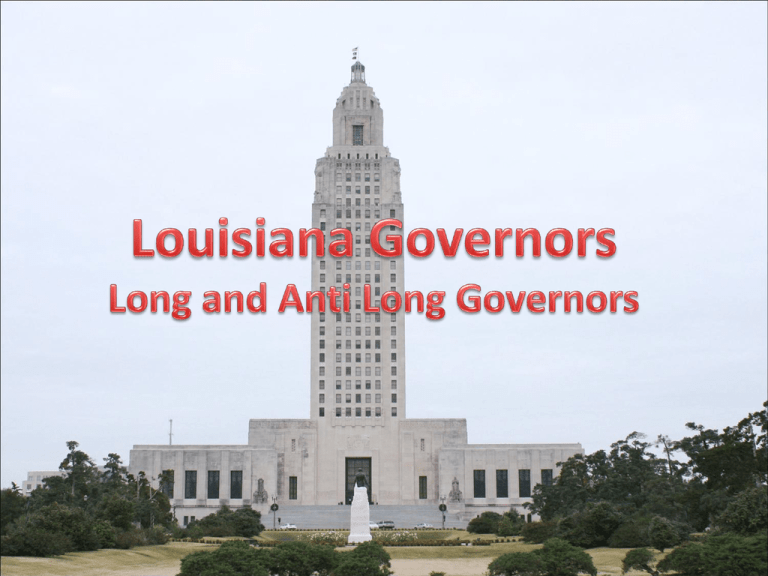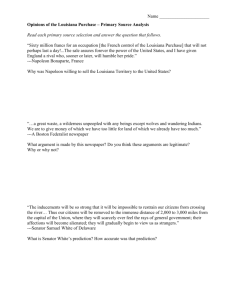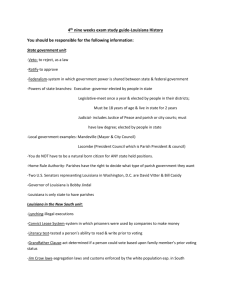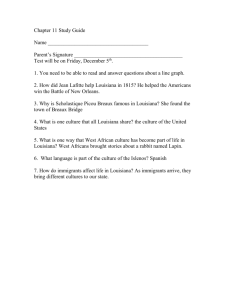Huey Long (1928-1932) through John McKeithen* (1964
advertisement

Huey Pierce Long, Jr. • • • • • • • • • • 40th Louisiana Governor Huey Pierce Long, Jr. (August 30, 1893 – September 10, 1935) Nicknamed The Kingfish American politician from the U.S. state of Louisiana. A Democrat, he was noted for his radical populist policies. He served as Governor of Louisiana from 1928 to 1932 and as a U.S. senator from 1932 to 1935. Though a backer of Franklin D. Roosevelt in the 1932 presidential election, Long split with Roosevelt in June 1933 and allegedly planned to mount his own presidential bid. Long created the Share Our Wealth program in 1934, with the motto "Every Man a King," proposing new wealth redistribution. He was an ardent critic of the Federal Reserve System. Charismatic and immensely popular for his social reform programs and willingness to take forceful action. At the height of his popularity, the colorful and flamboyant Long was shot on September 8, 1935, at the Louisiana State Capitol in Baton Rouge; he died two days later at the age of 42. Alvin Olin King • • • • • • • • • • Alvin Olin King (June 21, 1890 – January 21, 1958) Louisiana politician allied with the popular Long faction of the state Democratic Party. Democrat Served as Governor from January 25, 1932 until May 10, 1932 King was born in Leoti in Wichita County in western Kansas. He attended Tulane University Law School in New Orleans and began the practice of law. King was elected to the Louisiana State Senate from Calcasieu Parish in the southwestern part of the state and rose to president pro tempore of that body. When Huey Pierce Long, Jr., vacated the governorship for a seat in the United States Senate, King replaced him as governor for the five months remaining in Long's elected term. After leaving office, King reverted to his legal profession. Before his death in Lake Charles, King had become president of the Louisiana Bar Association. he was a Methodist. Oscar Kelly Allen, Sr. • • • • Oscar Kelly Allen, Sr. (August 8, 1882 - January 28, 1936), also known as O. K. Allen Democratic governor of Louisiana from 1932 to 1936. He was a key lieutenant in the political machine of Huey Pierce Long, Jr., that dominated the state during the first half of the 1930s. Allen succeeded Alvin Olin King, who served briefly in the state's highest office after Long left the governorship to take a seat in the United States Senate. James Albert Noe Sr. • • • • • • • • 43rd Louisiana Governor James Albert Noe Sr. (December 21, 1890 – October 18, 1976) of Monroe Served for nearly five months as a Democratic Governor of Louisiana after the death of Oscar K. Allen on January 28, 1936. Served from January 28, 1936 until May 12, 1936. During Noe's brief tenure, he appointed Huey Long's widow, Rose McConnell Long, to finish Long's seat in the U.S. Senate. Worked toward getting federal money for state highways and establishing a state welfare office. Prominent New Orleans businessman, succeeded his father in running the family-owned radio and television stations. Noe died in Houston, from complications from a heart condition and is buried alongside his wife in Monroe. Richard Webster Leche • • • • • • • • Richard Webster Leche (May 15, 1898 - February 22, 1965) was the Democratic governor of Louisiana from 1936 until 1939. Leche was the first governor of Louisiana sentenced to prison. Served from May 12, 1936 until June 26, 1939 After Huey Long was assassinated in September 1935, the Long organization was left without a leader and without a candidate for the 1936 gubernatorial election. Despite his relative obscurity, Leche was able to beat antiLong candidate Cleveland Dear with the aid of the stillpowerful Long political machine. While he continued Long's program of road-building, free textbooks, and expansion of hospital and educational facilities, Leche and his administration were far less committed to wealth redistribution and social programs than Long had been. In a reconciliation with the administration of President Franklin Delano Roosevelt, Leche promised to cease using Long's Share Our Wealth rhetoric and to support New Deal programs. In return, Roosevelt dropped investigation of the Long machine on tax evasion charges, and restored federal patronage to Louisiana. Once the corruption became too blatant, though, Leche and several of his cronies were indicted in what were termed the "Louisiana Scandals." Beset by scandal and accusations, Leche resigned the governorship on June 26, 1939; he was succeeded by his Lieutenant Governor Earl K. Long. Richard Leche's legal problems began when Chester Martin, a highway engineer who had his pay skimmed by Leche's newspaper, mimeographed receipts of the payments and a written summary of his allegations. He left them on the desks of every state legislature member the morning before the legislature came into session. Earl Kemp Long (1st Term) • • • • • Earl Kemp Long (August 26, 1895 – September 5, 1960) Younger brother of Huey P. Long Politician and three-time Democratic governor of Louisiana, who termed himself the "last of the red hot poppas" of politics, referring to his stump-speaking skills. He served from 1939-1940, 19481952, and 1956-1960. He was also lieutenant governor, having served from 1936-1939, but he failed in three other bids to be elected lieutenant governor. Sam H. Jones • • • Sam Houston Jones (July 15, 1897 – February 7, 1978) Was the reform Democratic governor of Louisiana from 1940 to 1944. Defeated the legendary Earl Kemp Long in the 1940 Democratic primary. Long turned the tables on Jones and soundly defeated him in the 1948 party primary. Jimmy Davis (1st Term) • • • James Houston Davis (September 11, 1899 November 5, 2000), better known as Jimmie Davis. Was a noted singer of both sacred and popular songs. Served two nonconsecutive terms as a Democratic governor of Louisiana (19441948 and 1960-1964). Earl Kemp Long (1st Term) • • • • • Earl Kemp Long (August 26, 1895 – September 5, 1960) Younger brother of Huey P. Long Politician and three-time Democratic governor of Louisiana, who termed himself the "last of the red hot poppas" of politics, referring to his stump-speaking skills. He served from 1939-1940, 19481952, and 1956-1960. He was also lieutenant governor, having served from 1936-1939, but he failed in three other bids to be elected lieutenant governor. Robert Kennon, Sr. • • • • • • Robert Floyd Kennon, Sr., known as Bob Kennon (August 12, 1902 - January 11, 1988), was a "good-government" reform Democratic governor of the U.S. state of Louisiana Served from 1952-1956. He failed to win a second nonconsecutive term in the 1963 Democratic primary. After the Brown v. Board of Education decision of May 17, 1954, Governor Kennon ordered the continued enforcement of laws relating to segregation. He vowed that the state would provide a public school system "which will include segregation in fact." Desegregation, however, began under Kennon's successors, Earl Kemp Long and James Houston "Jimmie" Davis, but it was a long process, not completed in Louisiana until August 1970. Earl Kemp Long (3rd Term) • • • • • Earl Kemp Long (August 26, 1895 – September 5, 1960) Younger brother of Huey P. Long Politician and three-time Democratic governor of Louisiana, who termed himself the "last of the red hot poppas" of politics, referring to his stump-speaking skills. He served from 1939-1940, 19481952, and 1956-1960. He was also lieutenant governor, having served from 1936-1939, but he failed in three other bids to be elected lieutenant governor. Jimmy Davis (2nd Term) • • James Houston Davis (September 11, 1899 November 5, 2000), better known as Jimmie Davis. Was a noted singer of both sacred and popular songs who served two nonconsecutive terms as a Democratic governor of Louisiana (1944-1948 and 1960-1964). John Julian McKeithen • • • • John Julian McKeithen (May 28, 1918 – June 4, 1999) was the 53rd Governor of Louisiana, Served from 1964 to 1972. A Democrat from the town of Columbia. He was the first governor of his state to serve two consecutive terms. As governor, he pushed for the construction of the Louisiana Superdome in New Orleans. • Photos and text from Wikipedia • Background photo of the State Capitol in Baton Rouge by Jude Dubois




